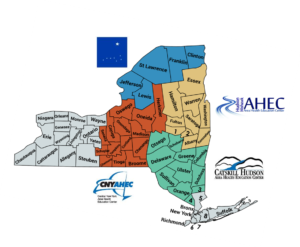NYS AHEC Rural Communities Opioid Response Program III

Addressing barriers to access in rural communities across New York State related to substance use disorder (SUD), including opioid use disorder (OUD), through prevention, treatment, and recovery.
Project Overview
In 2017, the US Department of Health and Human Services declared a public health emergency as a result of the growing opioid crisis sweeping the nation. With over 130 people dying every day from an opioid-related drug overdose, this crisis affects millions of Americans and New York State residents. The NYS AHEC System was awarded the first Rural Communities Opioid Response Program-Implementation I (RCORP I) Grant from the Health Resources and Services Administration (HRSA) in 2019, and was further awarded the Rural Communities Opioid Response Program-Implementation III (RCORP III) Grant in 2021. The purpose of this current grant is to implement substance use disorder (SUD), including opioid use disorder (OUD), initiatives in underserved rural areas. Rural communities face unique challenges when it comes to dealing with substance use disorder (SUD), including opioid use disorder (OUD). These challenges include provider shortages, limited local treatment options, and limited education and training opportunities. In addition, rural residents face various socioeconomic vulnerabilities not encountered by their urban counterparts. With the RCORP grant, the NYS AHEC system and partners will coordinate provider and community education, expand access to the treatment, and connect affected individuals and their families with community support in recovery.
Currently Participating AHEC Centers

Project Activities
 Prevention: In collaboration with local community partners, participating AHEC centers will coordinate community and provider education events that focus on increasing awareness of substance use disorders (SUD), including opioid use disorder (OUD) and decreasing related stigma. The events will include Naloxone/Narcan trainings as well as substance use trainings for health care professionals and law enforcement to learn best practices in preventing opioid usage and related deaths. In addition, provider partners will implement evidence based tools for screening and assessing individuals who are at risk for SUD/OUD.
Prevention: In collaboration with local community partners, participating AHEC centers will coordinate community and provider education events that focus on increasing awareness of substance use disorders (SUD), including opioid use disorder (OUD) and decreasing related stigma. The events will include Naloxone/Narcan trainings as well as substance use trainings for health care professionals and law enforcement to learn best practices in preventing opioid usage and related deaths. In addition, provider partners will implement evidence based tools for screening and assessing individuals who are at risk for SUD/OUD.
 Treatment: In collaboration with local community partners, participating AHEC centers and provider partners will increase the number of providers trained in Medication Assisted Treatment (MAT). MAT is used to treat OUD by incorporation medication with counseling or behavioral therapy. For more information on MAT, please visit: https://www.samhsa.gov/medication-assisted-treatment/treatment. Partners will also strengthen collaborations with local law enforcement, including first responders, through coordinating or supporting trainings to enhance their ability to provide emergency treatment to those with SUD/OUD.
Treatment: In collaboration with local community partners, participating AHEC centers and provider partners will increase the number of providers trained in Medication Assisted Treatment (MAT). MAT is used to treat OUD by incorporation medication with counseling or behavioral therapy. For more information on MAT, please visit: https://www.samhsa.gov/medication-assisted-treatment/treatment. Partners will also strengthen collaborations with local law enforcement, including first responders, through coordinating or supporting trainings to enhance their ability to provide emergency treatment to those with SUD/OUD.
 Recovery:In collaboration with local community partners, participating AHEC centers and provider partners will focus on developing recovery communities and organizations to expand availability and access to recovery services. Through the identification and development of recovery support services, we hope to expand the availability and access to local services and enable individuals, families, and caregivers to find resources that best suit their needs.
Recovery:In collaboration with local community partners, participating AHEC centers and provider partners will focus on developing recovery communities and organizations to expand availability and access to recovery services. Through the identification and development of recovery support services, we hope to expand the availability and access to local services and enable individuals, families, and caregivers to find resources that best suit their needs.
Additional Resources
•Opioid Fact Sheet
Facts and information regarding the current national opioid crisis.
•National Helpline: 1-800-662-HELP (4357)
SAMHSA’s National Helpline is a free, confidential, 24/7, 365-day-a-year treatment referral and information service (in English and Spanish) for individuals and families facing mental and/or substance use disorders.
•NYS Helpline: 1-877-8-HOPENY
Offering help and hope 24 hours a day, 365 days a year for alcoholism, drug abuse and problem gambling. All calls are toll-free, anonymous and confidential.
•Opioid Treatment Program Directory
•Buprenorphine Practitioner Locator